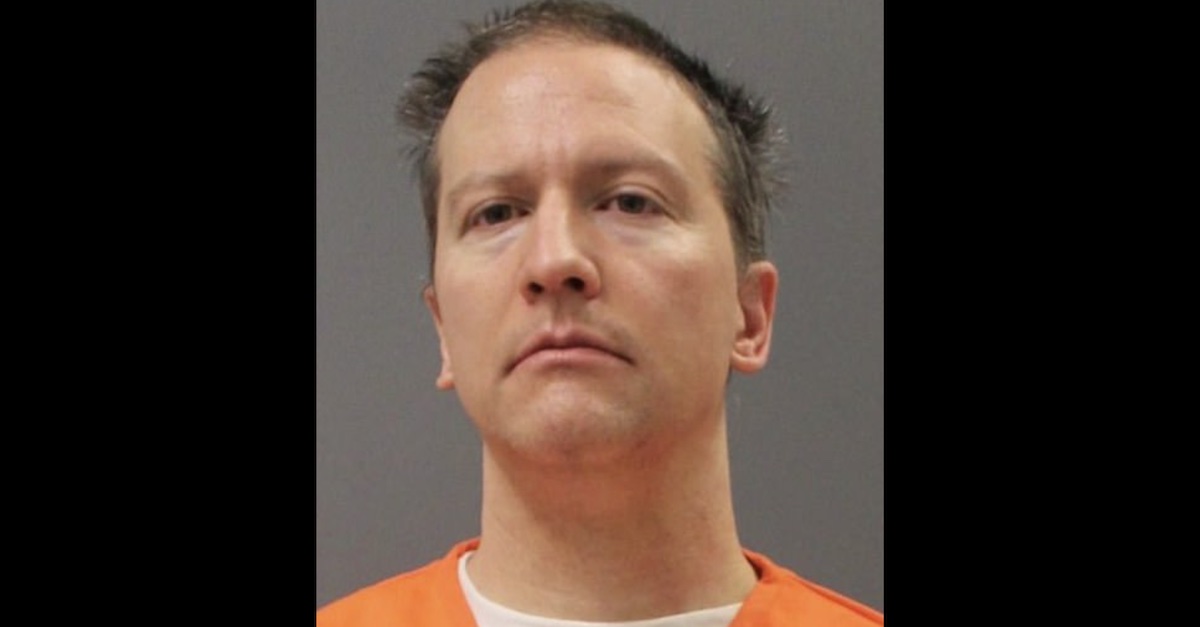
Post-conviction mugshot.
The former Minneapolis police officer convicted in state court of murdering George Floyd, Jr., faced a federal judge Tuesday on charges he violated the civil rights of two suspects.
Chauvin is charged federally with two counts of Deprivation of Rights Under Color of Law regarding a September 4, 2017 incident involving a 14-year-old. He is also charged with two counts of Deprivation of Rights Under Color of Law in connection with Floyd’s death.
Chauvin’s initial appearance was before U.S. Magistrate Judge Becky R. Thorson. Though Chauvin is charged in two separate cases, the initial appearance covered both matters.
Chauvin confirmed that he could both see and hear Thorson in the remote Zoom hearing. Thorson allowed Chauvin to remove his face mask and described at the judge’s direction what he was seeing on his virtual courtroom screen. Chauvin consented to holding the hearing via videoconference.
Assistant U.S. Attorney Manda Sertich said the government had no objection to holding the initial appearance via videoconference. Defense attorney Eric J. Nelson concurred by lodging no objection.
Judge Thorson reminded the government of its obligation to hand exculpatory evidence to the defense under Brady v. Maryland and other cases. She told Chauvin he had the right to remain silent.
Chauvin gave his full name for the court — Derek Michael Chauvin — and said he is 45 years old.
Thorson then laid out the indictments against Chauvin.
“Yes, your honor,” Chauvin said when asked if he read the indictments and understood them.
Thorson noted that “the court has already appointed counsel” in both of the federal cases.
As Law&Crime noted earlier Tuesday, Chauvin’s previous attorney, Eric J. Nelson, has been appointed to represent him in federal court. According to court records, Nelson is now being paid as an appointed attorney for the “financially unable” defendant.
“Yes, your honor,” Chauvin said when the judge asked if he wished to proceed with Nelson as his defense counsel.
“I do, your honor,” Nelson responded when asked if he wished to accept the appointment.
The government then moved to keep Chauvin detained pending trial and said it was prepared to submit a detention order for the judge to sign. The defense did not oppose the motion for detention. Chauvin said he did not realize the issue was up for debate given his “current situation.” Though the remote telephone connection was spotty, he appeared to say he believed it was a “moot point” to contest his federal detention — presumably because he has already been convicted of murder in state court and faces up to 40 years in prison. Chauvin has not yet been sentenced in Minnesota state court after a jury there convicted him in April of murdering George Floyd. Chauvin is scheduled to be sentenced on those state charges on June 25.
Judge Thorson gave Chauvin a moment to speak privately with his attorney to review the matter of pretrial detention. After a minute or two, a somewhat dejected-sounding Chauvin agreed to waive his right to a federal detention hearing.
The judge never mentioned Chauvin’s state court conviction during the process. She said Chauvin would remain in the custody of the U.S. Marshals Service pending future proceedings in federal court.
Thorson said an arraignment would be the next step in the proceeding.
Prosecutors said they had “nothing further” to address on the record.
Neither did Nelson.
“That concludes the initial appearance,” Thorson said while thanking the parties for their assistance in setting up the remote proceeding. No future court date was immediately scheduled.
[Image via the Minnesota Department of Corrections]